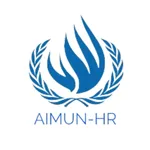Conference
Online
Jun 29 - Jun 30, 2024
150 delegates expected
University Students and School Students
Applications
Chairs
Apr 22, 2024 - Jun 1, 2024
Delegates
Apr 22, 2024 - Jun 1, 2024
"Unity, Diplomacy, and Resolve: Shaping the Future Amidst Conflict"
The All India Modern United Nations - Human Rights (AIMUN-HR) conference stands as a testament to the power of diplomacy, dialogue, and advocacy in addressing some of the most pressing challenges facing humanity today. With a focus on human rights, AIMUN-HR provides a platform for delegates from across India to engage in rigorous debate, negotiation, and consensus-building, all aimed at advancing the principles and practices of human rights on a global scale.
In this comprehensive guide, we will delve into the ethos, objectives, and structure of AIMUN-HR, exploring the conference's rich history, its significance in the context of modern diplomacy, and the myriad opportunities it offers to empower young minds and shape future leaders. From its inception to its evolution into a premier platform for diplomatic engagement, AIMUN-HR embodies the spirit of collaboration, empathy, and global citizenship, serving as a catalyst for positive change in the world.
The Origins of AIMUN-HR
The origins of AIMUN-HR can be traced back to the early days of Model United Nations (MUN) conferences in India. As the popularity of MUNs grew across the country, there emerged a need for a specialized forum dedicated to the discussion of human rights issues. Recognizing this need, a group of passionate young leaders came together to conceptualize and organize AIMUN-HR, with the aim of creating a space where human rights could take center stage.
The inaugural AIMUN-HR conference took place in Mumbai in 2015, marking the beginning of a transformative journey towards greater awareness, advocacy, and action on human rights issues. Since then, AIMUN-HR has grown in scale and scope, attracting delegates from diverse backgrounds and regions, and earning a reputation as one of the most prestigious MUN conferences in India.
The Significance of AIMUN-HR
AIMUN-HR holds immense significance in the landscape of modern diplomacy and human rights advocacy for several reasons. Firstly, it provides a platform for young leaders to engage with complex human rights issues in a structured and rigorous manner. Through research, debate, and negotiation, delegates gain a deeper understanding of the challenges facing the global community and develop the skills necessary to address them effectively.
Secondly, AIMUN-HR fosters a culture of empathy, understanding, and collaboration among delegates. By bringing together individuals from diverse backgrounds, AIMUN-HR creates opportunities for dialogue and exchange, breaking down barriers and building bridges across cultures, ideologies, and perspectives.
Thirdly, AIMUN-HR serves as a training ground for future leaders and changemakers. Through their participation in the conference, delegates develop critical skills such as public speaking, negotiation, and diplomacy, which are essential for success in the modern world. Moreover, AIMUN-HR inspires delegates to become active citizens and advocates for human rights in their communities and beyond, empowering them to make a positive impact on the world.
The Structure of AIMUN-HR
AIMUN-HR follows a comprehensive structure designed to maximize delegate engagement, facilitate meaningful debate, and promote consensus-building. The conference typically consists of several committees, each focusing on a specific area of human rights. These committees may include the General Assembly, the Security Council, the Human Rights Council, and specialized committees such as the Committee on the Rights of the Child or the Committee on Gender Equality.
Delegates are assigned roles representing different countries or stakeholders and are tasked with researching, drafting resolutions, and advocating for their positions during committee sessions. Throughout the conference, delegates engage in formal debate, informal negotiations, and caucus sessions, working together to address the challenges and opportunities presented by the conference agenda.
In addition to committee sessions, AIMUN-HR may also feature keynote addresses, panel discussions, workshops, and cultural events, providing delegates with a holistic and enriching experience. By combining substantive debate with interactive learning opportunities, AIMUN-HR ensures that delegates leave the conference with a deeper understanding of human rights issues and a renewed commitment to effecting positive change in the world.
The Impact of AIMUN-HR
Over the years, AIMUN-HR has had a profound impact on the lives of countless delegates, organizers, and participants. For many, the conference serves as a formative experience, shaping their worldview, honing their skills, and inspiring them to pursue careers in diplomacy, law, activism, and other fields related to human rights.
AIMUN-HR has also played a crucial role in raising awareness and mobilizing action on human rights issues in India and beyond. Through its discussions, resolutions, and advocacy efforts, AIMUN-HR has contributed to progress on a wide range of issues, including gender equality, LGBTQ+ rights, refugee rights, indigenous rights, and environmental justice.
Moreover, AIMUN-HR has fostered a vibrant community of alumni, supporters, and partners who continue to champion the cause of human rights long after the conference ends. Whether through professional endeavors, volunteer work, or grassroots activism, AIMUN-HR alumni are making a tangible difference in the world, embodying the conference's ethos of empowerment, solidarity, and social justice.
Conclusion
As we reflect on the journey of AIMUN-HR, from its humble beginnings to its status as a leading platform for human rights advocacy, we are reminded of the power of young people to effect positive change in the world. Through their passion, creativity, and determination, delegates at AIMUN-HR are not merely observers of history but active participants in shaping the future of our planet.
As AIMUN-HR continues to evolve and grow, it remains committed to its founding principles of empathy, understanding, and collaboration. By empowering minds and shaping futures, AIMUN-HR is building bridges for global harmony, advancing the cause of human rights, and creating a world where dignity, equality, and justice prevail for all.
Committees
